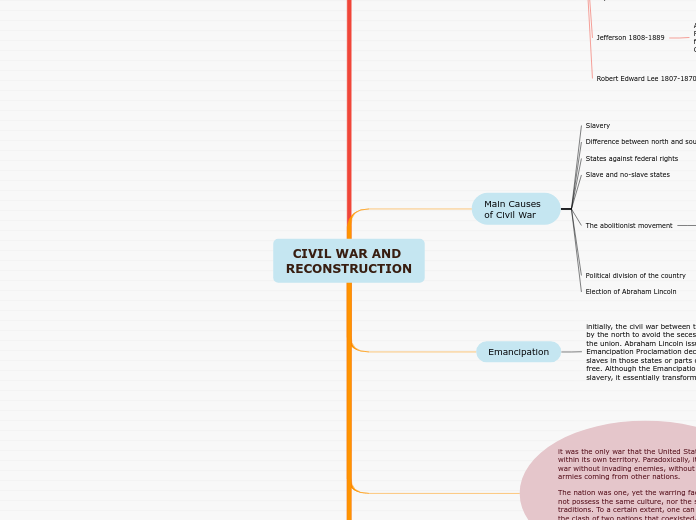von ALVIN GONZALEZ Vor 5 Jahren
364
CIVIL WAR AND RECONSTRUCTION

von ALVIN GONZALEZ Vor 5 Jahren
364

Mehr dazu

To name your story, you have to think about the overall message and what you want your audience to understand from the story. Also, make it relevant and easy to remember.
The ending of a story is essential. We all know that if the ending is weak, what happened before loses its importance. So make it unpredictable, but fair. A resolved ending answers all the questions and ties up any loose threads from the plot.
Transcontinental Railroad is completed (1869), increasing movement west.
Economy based on agriculture, mining and railroads.
Huge economic boom.
Remained an agricultural economy and poorest section.
Confederate and worthless.
Labor shortage, no more slavery.
Cities in ruins.
Farms, railroads, and factories destroyed.
The united States becomes a global economic power.
Foundation fo the industrial Revolution.
Emerged with a strong and growing industrial economy.
many people, both black, white, male, and female became spokespersons for the ending of slavery.
some others were calling for immediate abolishment of slavery, regardless of the impact on southern.
most abolitionists were in favor of a slow emancipation so as not to hurt the southern economy.
In the beginning of the story (or the exposition), you will need to introduce the setting and characters. You might also want to introduce the main conflict. This part of the story is important because it gives the reader necessary background information and maybe even a first insight into a character’s personality.
He was the main executor of the national reconstruction plans after the war ended.
main achievements
modernization of the economy
strengthening of the federal state
abolition of slavery
The setting (time & place) of a story can change throughout the plot.
Sensory details include sight, sound, touch, smell, and taste. These details are important because they create depth in your setting.
See a few examples below:
Sensory details
The weather is an important element in your story because it can highly influence the ambiance and the mood of the characters.
Do these weather conditions affect the main character?
The most affected character is the main character. Write down here if he/she is affected by these weather conditions in any way. For example, if they lost a family member or their home during a hurricane, etc.
Elements of nature
Decide if you want to include an element of nature in your story. For example, a rainbow can be a very nice choice for a happy ending. The mist in a story can represent mystery and secrets. A thunder can appear in the background at the moment when the 'bad guy' of the story makes its appearance, etc.
Catastrophic event
Does your story include catastrophic weather? See a few suggestions below or add your own:
- hurricane, earthquake, storm, etc
The time of the story can also change. It can describe the event of a single day or can include an entire year's plot. Anyway, don't forget to mention it.
Time of plot
Your story can take place wherever your imagination will take you to.
For example: in an elevator, in an enchanted forest, etc. Don't forget to give details of the environment each time the setting changes, otherwise, the story can be confusing. Also, mention the seasons as each of them has unique weather and events.
Location
Characters are essential to a good story. Usually, the protagonist(s) is/are the most affected by the plot. Introduce a character by focusing on their actions, interests, and occupation, as the physical appearance doesn't make a difference in most cases.
Type in the name of your character.
Other
Add other qualities/attributes of the character.
Main Goal
What is your character's main goal?
Character traits
Which traits best describe the character's personality? Choose more if necessary:
Type of character
Choose the type of your chacter: